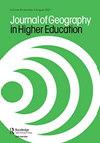集体责任的地理学:通过基于地点的实践使大学非殖民化
IF 1.8
4区 教育学
Q2 EDUCATION & EDUCATIONAL RESEARCH
引用次数: 0
摘要
本文提出的问题是,作为地理学家,我们占据着相对特权的位置,但也对与殖民主义遗产和正在进行的殖民化纠缠在一起的机构负有责任,如何找到并体现我们对土著人民和国家的责任,并在学术界内外为非殖民化做出贡献?我们首先反思Doreen Massey(2004)的责任地理学理论以及在此期间对其的批评。然后,我们将涉及重要的考虑因素,包括承认的政治,定居者殖民主义的关系语法和土著关系概念。为了避免承认政治的陷阱,这种陷阱常常使责任丧失更大的变革可能性,我们提出了在我们的教学、研究和专业服务中承担非殖民化责任的方法。虽然我们不能为在学术界进行非殖民化的困难挑战提供简单的解决办法,但我们认为,需要集中和优先考虑通过地方和通过地方支持土著民族复兴的责任关系,以避免殖民承认和表面的表演非殖民化的剥蚀和个体化过程。本文章由计算机程序翻译,如有差异,请以英文原文为准。
Geographies of collective responsibility: decolonising universities through place-based praxis
This paper asks how can we as geographers, occupying positions of relative privilege but also beholden to institutions entangled with legacies of colonialism and ongoing colonization, find and embody our responsibilities to Indigenous people and nations and contribute to decolonization within and beyond the academy? We begin by reflecting on Doreen Massey’s (2004) theorization of geographies of responsibility and critiques of it in the intervening years. We then engage with important considerations including the politics of recognition, relational grammars of settler colonialism and Indigenous notions of relationality. To avoid the traps of recognition politics, which often foreclose the more transformative possibilities of responsibility, we propose ways of taking of decolonial responsibility in our teaching, research and professional service. While we cannot provide simple solutions to the difficult challenge of pursuing decolonization in the academy, we believe that centralizing and prioritizing relationships of responsibility to and through place in support of resurgent Indigenous nationhood is required to avoid the denuding, individualizing process of colonial recognition and superficial performative decolonisation.
求助全文
通过发布文献求助,成功后即可免费获取论文全文。
去求助
来源期刊

Journal of Geography in Higher Education
Multiple-
CiteScore
5.80
自引率
9.50%
发文量
29
期刊介绍:
The Journal of Geography in Higher Education ( JGHE) was founded upon the conviction that the development of learning and teaching was vitally important to higher education. It is committed to promote, enhance and share geography learning and teaching in all institutions of higher education throughout the world, and provides a forum for geographers and others, regardless of their specialisms, to discuss common educational interests, to present the results of educational research, and to advocate new ideas.
 求助内容:
求助内容: 应助结果提醒方式:
应助结果提醒方式:


